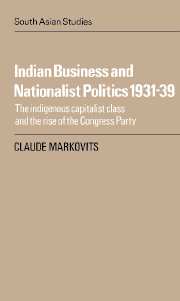 Indian Business and Nationalist Politics 1931–39
Indian Business and Nationalist Politics 1931–39 from APPENDICES
Published online by Cambridge University Press: 25 October 2009
APPENDIX II
A Bombay manifesto of twenty-one businessmen 'Pandit Jawaharlal Nehru, in his presidential speech at the Lucknow Congress, said: “I see no way of ending the poverty, the vast unemployment, the degradation and the subjection of the Indian people except through socialism. That involves vast and revolutionary changes in our political and social structure, the ending of vested interests in land and industry, as well as the feudal and autocratic Indian States system. That means the ending of private property, except in a restricted sense, and the replacement of the present profit system by a higher ideal of cooperative service.”
'This has been described as a new civilization and illustrated by what is happening in Soviet Russia today.
'We have no hesitation in declaring that we are unequivocally opposed to ideas of this kind being propagated, as in the present condition of widespread economic misery in the country, they are likely to find ready though unthinking reception. We are convinced that there is a grave risk of the masses of the country being misled by such doctrines into believing that all that is required for the improvement of their well-being is a total destruction of the existing social and economic structure. The inculcation of any such ideas into the mind of unthinking millions of this country would lead to a situation in which not only the institution of private property but the peaceful observance of religion, and even personal safety, are likely to be jeopardised.
To save this book to your Kindle, first ensure [email protected] is added to your Approved Personal Document E-mail List under your Personal Document Settings on the Manage Your Content and Devices page of your Amazon account. Then enter the ‘name’ part of your Kindle email address below. Find out more about saving to your Kindle.
Note you can select to save to either the @free.kindle.com or @kindle.com variations. ‘@free.kindle.com’ emails are free but can only be saved to your device when it is connected to wi-fi. ‘@kindle.com’ emails can be delivered even when you are not connected to wi-fi, but note that service fees apply.
Find out more about the Kindle Personal Document Service.
To save content items to your account, please confirm that you agree to abide by our usage policies. If this is the first time you use this feature, you will be asked to authorise Cambridge Core to connect with your account. Find out more about saving content to Dropbox.
To save content items to your account, please confirm that you agree to abide by our usage policies. If this is the first time you use this feature, you will be asked to authorise Cambridge Core to connect with your account. Find out more about saving content to Google Drive.